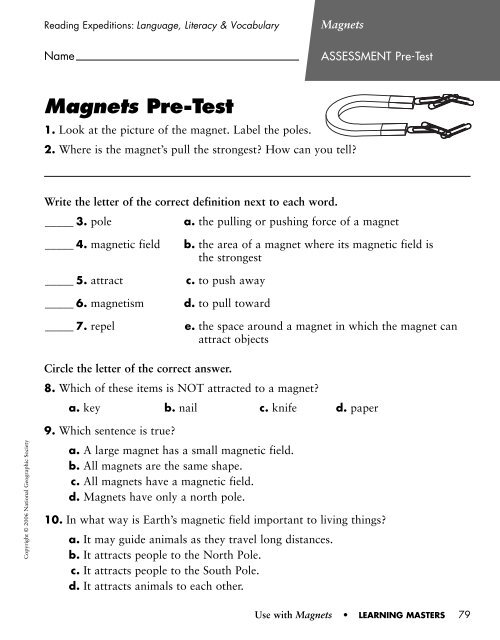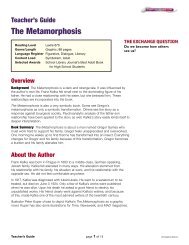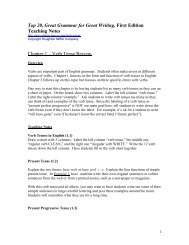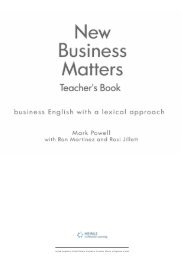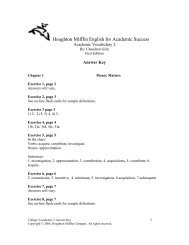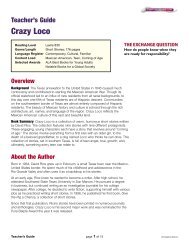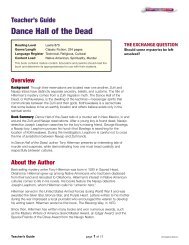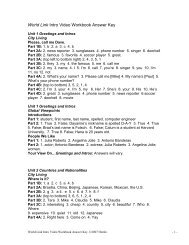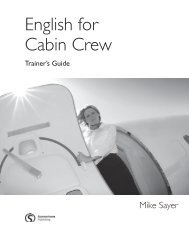Magnets Pre-Test
Magnets Pre-Test
Magnets Pre-Test
You also want an ePaper? Increase the reach of your titles
YUMPU automatically turns print PDFs into web optimized ePapers that Google loves.
Copyright © 2006 National Geographic Society<br />
Reading Expeditions: Language, Literacy & Vocabulary<br />
Name<br />
<strong>Magnets</strong> <strong>Pre</strong>-<strong>Test</strong><br />
1. Look at the picture of the magnet. Label the poles.<br />
2. Where is the magnet’s pull the strongest? How can you tell?<br />
Write the letter of the correct definition next to each word.<br />
_____ 3. pole a. the pulling or pushing force of a magnet<br />
_____ 4. magnetic field b. the area of a magnet where its magnetic field is<br />
the strongest<br />
_____ 5. attract c. to push away<br />
_____ 6. magnetism d. to pull toward<br />
_____ 7. repel e. the space around a magnet in which the magnet can<br />
attract objects<br />
Circle the letter of the correct answer.<br />
8. Which of these items is NOT attracted to a magnet?<br />
a. key b. nail c. knife d. paper<br />
9. Which sentence is true?<br />
a. A large magnet has a small magnetic field.<br />
b. All magnets are the same shape.<br />
c. All magnets have a magnetic field.<br />
d. <strong>Magnets</strong> have only a north pole.<br />
10. In what way is Earth’s magnetic field important to living things?<br />
a. It may guide animals as they travel long distances.<br />
b. It attracts people to the North Pole.<br />
c. It attracts people to the South Pole.<br />
d. It attracts animals to each other.<br />
<strong>Magnets</strong><br />
ASSESSMENT <strong>Pre</strong>-<strong>Test</strong><br />
Use with <strong>Magnets</strong> • LEARNING MASTERS 79
<strong>Magnets</strong><br />
BUILD BACKGROUND<br />
Magnetism Chart<br />
<strong>Pre</strong>dict whether or not each item is attracted to a magnet. Put a<br />
checkmark in the correct column. The first one has been done for<br />
you. After you finish the chart, answer the questions.<br />
1. penny<br />
2. rubber ball<br />
3. nail<br />
4. paper<br />
5. chalk<br />
6. key<br />
Name<br />
Does It Have Magnetism?<br />
Object Attracted to <strong>Magnets</strong><br />
7. <strong>Test</strong> which items in the chart are attracted to magnets. What do<br />
these objects have in common?<br />
8. Name one object that is not attracted to magnets and explain why.<br />
9. Name one object that is attracted to magnets and explain why.<br />
80 LEARNING MASTERS • Use with <strong>Magnets</strong>, pages 4–5<br />
Reading Expeditions: Language, Literacy & Vocabulary<br />
✓<br />
Not Attracted<br />
to <strong>Magnets</strong><br />
Copyright © 2006 National Geographic Society
Copyright © 2006 National Geographic Society<br />
Reading Expeditions: Language, Literacy & Vocabulary<br />
Name<br />
<strong>Magnets</strong><br />
Look at the picture.<br />
• Read the sentences about the picture.<br />
• Fill in each blank with a Key Concept Word.<br />
1. The space around a magnet in which the magnet can attract objects<br />
is called the .<br />
2. A force pulls or pushes other metal objects toward or away from the<br />
magnet. This force is called .<br />
3. At each end of the magnet is a . The force is<br />
strongest at these spots.<br />
4. A magnet can an object. This means it pulls<br />
the object toward it.<br />
5. A magnet can also an object. This means it<br />
pushes the object away from it.<br />
<strong>Magnets</strong><br />
BUILD BACKGROUND<br />
Write your own sentence about the picture. Use at least one Key<br />
Concept Word. Be sure the sentence gives clues to the word’s meaning.<br />
KEY CONCEPT WORDS<br />
attract<br />
magnetic field<br />
magnetism<br />
pole<br />
repel<br />
Use with <strong>Magnets</strong>, pages 4–5 • LEARNING MASTERS 81
<strong>Magnets</strong><br />
UNDERSTAND THE BIG IDEA<br />
Study Guide<br />
Name<br />
Pages 6–7<br />
Read Questions You Will Explore on page 6 of <strong>Magnets</strong>. Write what<br />
you already know about each question.<br />
Pages 8–11<br />
Read about magnets, magnetic fields, and poles on pages 8–11 of<br />
<strong>Magnets</strong>. Write two important facts about each.<br />
82 LEARNING MASTERS • Use with <strong>Magnets</strong>, pages 6–11<br />
Reading Expeditions: Language, Literacy & Vocabulary<br />
Questions What I Already Know About This<br />
1. How do magnets work?<br />
2. What is a magnetic field?<br />
<strong>Magnets</strong> 1.<br />
2.<br />
Magnetic fields 1.<br />
2.<br />
Poles 1.<br />
2.<br />
Copyright © 2006 National Geographic Society
Copyright © 2006 National Geographic Society<br />
Reading Expeditions: Language, Literacy & Vocabulary<br />
Name<br />
Study Guide<br />
Pages 12–13<br />
Read about different magnets on pages 12–13 of <strong>Magnets</strong>. Draw a<br />
picture of something you might use a strong magnet to attract. Draw a<br />
picture of something you might use a weak magnet to attract. Then<br />
write a sentence about each of your pictures.<br />
Strong Magnet Weak Magnet<br />
Pages 14–15<br />
Read about Earth and its magnetism on pages 14–15 of <strong>Magnets</strong>.<br />
Then read the statements below.<br />
Circle T if the statement is true. Circle F it is false.<br />
1. There are large magnets in junkyards. T F<br />
2. Earth is a magnet. T F<br />
3. Earth has a north pole but no south pole. T F<br />
4. Earth’s magnetism can be felt by many animals. T F<br />
5. Earth’s magnetism affects only people. T F<br />
Stop and Think! How are all magnets alike?<br />
<strong>Magnets</strong><br />
UNDERSTAND THE BIG IDEA<br />
Use with <strong>Magnets</strong>, pages 12–15 • LEARNING MASTERS 83
<strong>Magnets</strong><br />
TAKE A CLOSER LOOK<br />
Study Guide<br />
Pages 16–17<br />
Read pages 16–17 of <strong>Magnets</strong>. Answer the questions.<br />
1. Look at the title of this section. What animals will you read about?<br />
2. What question do you have about this section of the book?<br />
3. How does Earth’s magnetic field help loggerhead turtles?<br />
Pages 18–19<br />
Read pages 18–19 of <strong>Magnets</strong>. Number the events of a loggerhead<br />
turtle’s life in the correct order. The first event is done for you.<br />
_____ The eggs hatch.<br />
_____ The turtles start to swim.<br />
_____ 1<br />
A loggerhead turtle lays eggs.<br />
_____ The turtles race to the ocean.<br />
Name<br />
84 LEARNING MASTERS • Use with <strong>Magnets</strong>, pages 16–19<br />
Reading Expeditions: Language, Literacy & Vocabulary<br />
Copyright © 2006 National Geographic Society
Copyright © 2006 National Geographic Society<br />
Reading Expeditions: Language, Literacy & Vocabulary<br />
Name<br />
Study Guide<br />
<strong>Magnets</strong><br />
TAKE A CLOSER LOOK<br />
Practice the Comprehension Strategy: Making Inferences<br />
Read about the turtles’ journey and how scientists are studying them<br />
on pages 20–23 of <strong>Magnets</strong>. For each statement below, write an<br />
inference you can make.<br />
Page What I Read What I Infer<br />
20 A loggerhead’s journey begins in the<br />
ocean near Florida.<br />
21 The turtle swims for months across<br />
the ocean.<br />
22 Food is harder to find.<br />
23 But some scientists believe that<br />
loggerheads use Earth’s magnetic field<br />
to find their way.<br />
Loggerheads are very strong<br />
swimmers.<br />
Stop and Think! How is magnetism important to loggerhead sea turtles?<br />
Use with <strong>Magnets</strong>, pages 20–23 • LEARNING MASTERS 85
<strong>Magnets</strong><br />
MAKE CONNECTIONS<br />
Summarize Key Concepts<br />
Think about what you have learned about magnets. Read each<br />
fact below. Go back through the book and write the page number<br />
where the fact first appears. Then write two details about each<br />
fact. Use words from the Word Box for some of your details.<br />
1. Fact: All magnets have a magnetic field. Page:<br />
Detail:<br />
Detail:<br />
2. Fact: <strong>Magnets</strong> have a north pole and a south pole. Page:<br />
Detail:<br />
Detail:<br />
3. Fact: Some magnets have a stronger magnetic field than other magnets.<br />
Page:<br />
Detail:<br />
Detail:<br />
4. Fact: Earth is a large magnet. Page:<br />
Detail:<br />
Detail:<br />
Name<br />
86 LEARNING MASTERS • Use with <strong>Magnets</strong>, pages 24–25<br />
Reading Expeditions: Language, Literacy & Vocabulary<br />
WORD BOX<br />
attract<br />
magnetic field<br />
magnetism<br />
pole<br />
repel<br />
Copyright © 2006 National Geographic Society
Copyright © 2006 National Geographic Society<br />
Reading Expeditions: Language, Literacy & Vocabulary<br />
Name<br />
Study Guide<br />
<strong>Magnets</strong><br />
MAKE CONNECTIONS<br />
Practice the Comprehension Strategy: Making Inferences<br />
Read pages 26–29 of <strong>Magnets</strong>. In the chart below, write statements you<br />
find from which you can make inferences. Write the statements and the<br />
inferences you make.<br />
Page What I Read What I Infer<br />
26<br />
27<br />
28<br />
29<br />
Use with <strong>Magnets</strong>, pages 26–29 • LEARNING MASTERS 87
<strong>Magnets</strong><br />
ZOOM IN ON WORDS<br />
Synonyms<br />
Write a word from the box that is a synonym of each word in<br />
bold print.<br />
1. The strong magnetic field shows the turtle the correct path<br />
to take.<br />
2. The turtle uses Earth’s magnetic field to guide its journey.<br />
3. Magnetism is the pulling force of a magnet.<br />
4. A magnet can attract or repel an object.<br />
Multiple-Meaning Words<br />
Write two sentences that include each of the multiple-meaning words<br />
below. Each sentence should use a different meaning of the word.<br />
5. guide<br />
6. object<br />
Name<br />
88 LEARNING MASTERS • Use with <strong>Magnets</strong>, pages 30–31<br />
Reading Expeditions: Language, Literacy & Vocabulary<br />
WORD BOX<br />
item<br />
lead<br />
mighty<br />
power<br />
Copyright © 2006 National Geographic Society
Copyright © 2006 National Geographic Society<br />
Reading Expeditions: Language, Literacy & Vocabulary<br />
Name<br />
Magnet Table<br />
<strong>Magnets</strong><br />
Use the table to find which objects are attracted to a magnet.<br />
• In the first column, write the name of the object you test with<br />
your magnet.<br />
• Place a checkmark in the correct column to show whether the<br />
object was attracted to the magnet or not.<br />
• <strong>Test</strong> at least 10 objects.<br />
RESEARCH AND WRITE<br />
Object <strong>Test</strong>ed Yes No<br />
Use with <strong>Magnets</strong>, page 32 • LEARNING MASTERS 89
<strong>Magnets</strong><br />
RESEARCH AND WRITE<br />
Writing Frame<br />
Name<br />
You have researched materials that are attracted to magnets. Use this<br />
writing frame to write about what you learned.<br />
Title:<br />
When you revise, ask:<br />
• Is my information clear?<br />
• Can I make my sentences more<br />
interesting?<br />
90 LEARNING MASTERS • Use with <strong>Magnets</strong>, page 32<br />
Reading Expeditions: Language, Literacy & Vocabulary<br />
I tested different objects to see if they were attracted to a magnet.<br />
(number)<br />
The objects were:<br />
and . Out of the I tested,<br />
(item)<br />
(number)<br />
(which were attracted)<br />
(names of items)<br />
(names of items)<br />
, and were<br />
(which were attracted)<br />
attracted to the magnet. The others were not. All the objects that were attracted<br />
to the magnet had in them. This shows that<br />
(what object is made of)<br />
magnets attract objects made of .<br />
(what object is made of)<br />
Revising and Editing Checklist<br />
(which were attracted)<br />
When you edit, ask:<br />
• Did I spell words correctly?<br />
• Do the subjects and verbs agree?<br />
Copyright © 2006 National Geographic Society
Copyright © 2006 National Geographic Society<br />
Reading Expeditions: Language, Literacy & Vocabulary<br />
Name<br />
<strong>Magnets</strong> Post-<strong>Test</strong><br />
1. Look at the picture of the magnet. Label the poles.<br />
2. Explain what attract and repel mean when you tell about magnets.<br />
3. Tell how loggerhead turtles use magnetic fields.<br />
Circle the letter of the correct answer.<br />
4. Which sentence is true?<br />
a. All magnets have a magnetic field.<br />
b. <strong>Magnets</strong> have only a north pole.<br />
c. A large magnet has a small magnetic field.<br />
d. All magnets are the same shape.<br />
5. Which of these does a magnet attract?<br />
a. plastic b. glass c. rubber d. steel<br />
6. What does a maglev train NOT have?<br />
a. a track b. train cars c. an engine d. passengers<br />
Complete each sentence by filling in the blank.<br />
7. Two of the same poles , or push away, each other.<br />
8. The field is strongest at a magnet’s poles.<br />
9. Earth is a large .<br />
10. All magnets have two .<br />
<strong>Magnets</strong><br />
ASSESSMENT Post-<strong>Test</strong><br />
Use with <strong>Magnets</strong> • LEARNING MASTERS 91
<strong>Magnets</strong><br />
FAMILY FOCUS<br />
Dear Family,<br />
Your child has been reading the book <strong>Magnets</strong>. Use<br />
the information on this page to talk with your child<br />
about magnets, magnetic fields, and magnetism.<br />
Thank you.<br />
Key Ideas<br />
Your child has discussed these important ideas while<br />
reading <strong>Magnets</strong>.<br />
• All magnets have a magnetic field.<br />
• <strong>Magnets</strong> have a north pole and south pole.<br />
• Some magnets have a stronger magnetic field than<br />
other magnets.<br />
• Earth is a large magnet.<br />
92 LEARNING MASTERS • Use with <strong>Magnets</strong><br />
Reading Expeditions: Language, Literacy & Vocabulary<br />
Name<br />
Share and Learn<br />
WORDS TO KNOW<br />
attract to pull toward<br />
magnetic field the<br />
space around a magnet<br />
in which the magnet<br />
can attract objects<br />
magnetism the pulling<br />
or pushing force of a<br />
magnet<br />
pole the area of a<br />
magnet where its<br />
magnetic field is the<br />
strongest<br />
repel to push away<br />
Take a walk through your home<br />
with your child. Use a magnet to test for<br />
objects the magnet attracts. Write names of the<br />
objects in the chart below. Keep the chart and<br />
add to it as you continue to test more<br />
objects during the week.<br />
Name of Object Did Magnet Attract Object?<br />
Copyright © 2006 National Geographic Society
Copyright © 2006 National Geographic Society<br />
Reading Expeditions: Language, Literacy & Vocabulary<br />
Name<br />
Estimada familia,<br />
Su escolar está leyendo el libro <strong>Magnets</strong> (Los<br />
imanes). Favor de usar esta página para hablar<br />
con su escolar sobre los imanes, los campos<br />
magnéticos y el magnetismo.<br />
Gracias.<br />
Ideas clave<br />
Al leer <strong>Magnets</strong> su escolar estudió estas ideas<br />
importantes.<br />
• Todos los imanes tienen campo magnético.<br />
• Los imanes tienen un polo norte y un polo sur.<br />
• Algunos imanes tienen un campo magnético más<br />
fuerte que otros.<br />
• La Tierra es un imán grande.<br />
<strong>Magnets</strong><br />
Compartir y aprender<br />
ENFOQUE EN LA FAMILIA<br />
Ande por la casa con su<br />
escolar. Usen un imán para buscar<br />
objetos que el imán atraiga y repela. Escriba<br />
sus nombres en la tabla. Guarde la tabla y<br />
añade nombres de otros objetos<br />
durante la semana.<br />
VOCABULARIO<br />
atraer (attract) jalar<br />
campo magnético<br />
(magnetic field) espacio<br />
alrededor de un imán<br />
en donde el imán<br />
puede atraer objetos<br />
magnetismo<br />
(magnetism) fuerza<br />
de un imán que jala<br />
o empuja<br />
polo (pole) área de un<br />
imán donde el campo<br />
magnético es más fuerte<br />
repeler (repel) alejar<br />
Nombre del objeto ¿El imán lo atrajo?<br />
Use with <strong>Magnets</strong> • LEARNING MASTERS 93


